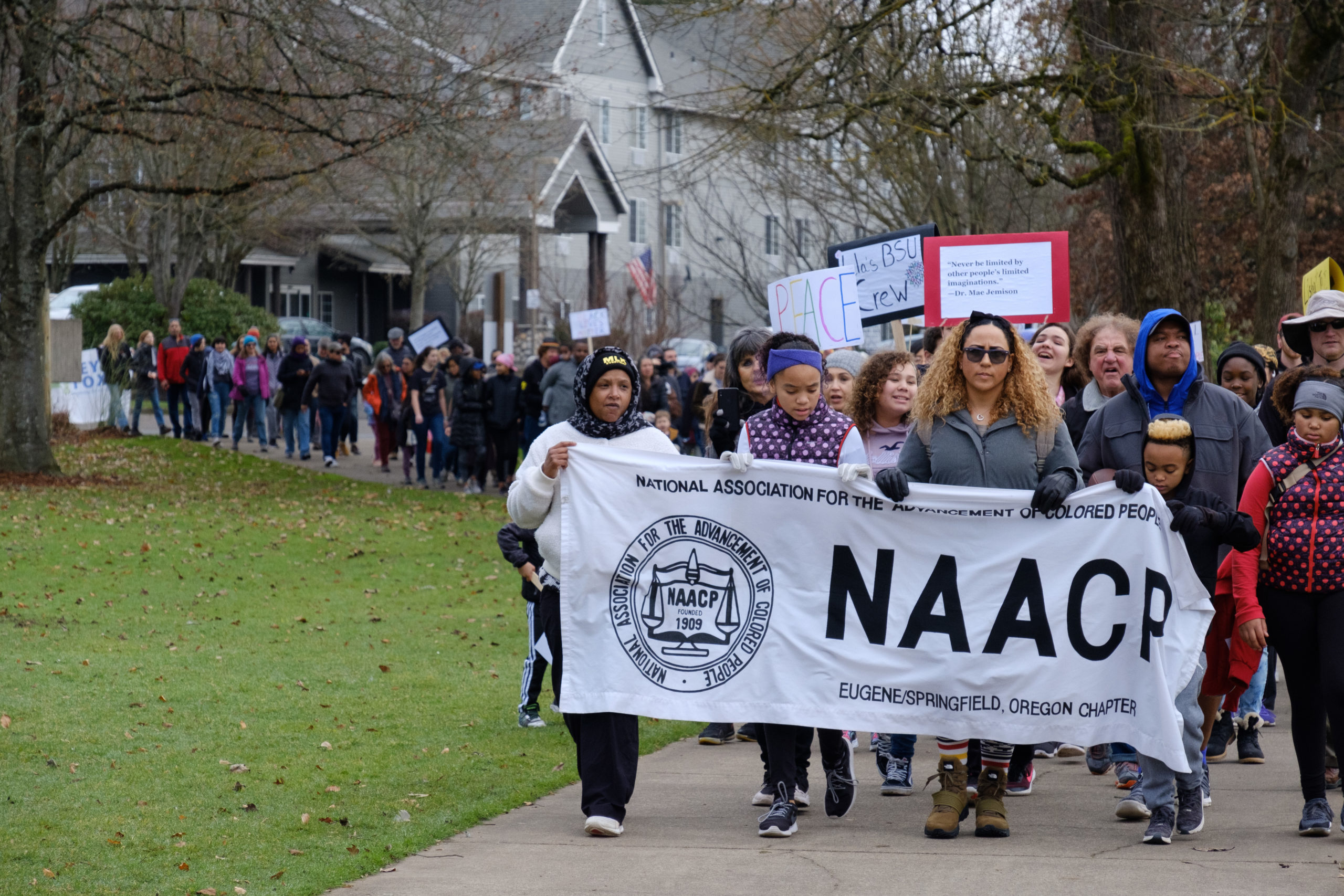Close to 500 people showed up on Jan. 20 to celebrate Eugene’s 34th Annual Martin Luther King Jr. March.
“We have members in the audience who helped bring forth that first march in 1984,” explained Eric Richardson, the Executive Director of the Lane County NAACP chapter.

The hour-long march started at Autzen Stadium, traveled through Alton Baker Park and ended at The Shedd Institute. The sound of Civil Rights anthems being sung accompanied by the blast of horns and pounding of drums resounded from the back of the procession.
Many elected officials were in attendance including Mayor Lucy Vinis, Lane County Commissioner Heather Buch, Judge Jodie Mooney, Senator James Manning, and U.S. Representative Peter Defazio.
Prior to the march, Eric Richardson called forth students from the local K-12 schools to stand around the stage before inviting them up to introduce themselves individually. He highlighted the importance of young people interested in activism to acquire public speaking experience.
A University of Oregon Representative, Dr. Lesley-Anne Pittard, also gave an opening speech. She spoke about her gratitude toward the man who the march commemorates, Dr. Martin Luther King Jr. A sentiment that would be echoed in the speeches of many of the speakers to follow.

“Thank you, Dr. King, for your legacy and for passing that torch onto each of us so that we can continue to bend the arc of the moral universe towards justice,” said Dr. Pitard.
The opening ceremonies ended with NAACP members introducing themselves. Pablo Luiz Alvarez, Lane County NAACP’s Environmental and Climate Justice Specialist, took a few minutes at this time to address climate change and its harrowing effects on the Eugene populace, “We have a location out in West Eugene with an 18 year lower life expectancy; 99% of our toxic emissions are emitted in West Eugene. It is also the location that has the highest minority population”
Upon arrival at The Shedd Institute, the Jordan Schnitzer Museum of Art advertised its new installation by Portland-born artist Carrie Mae Weems available from Jan. 18 to May 3. Entitled The Usual Suspects, it is comprised of still photography, documents, and videos that emerged during the Black Lives Matter movement. The University of Oregon will also be presenting Carrie Mae Weems with an honorary doctorate this Spring.
Mayor Lucy Vinis spoke about the shooting death of Eliborio Rodrigues by a Eugene Police Officer that took place in late Nov. 2019. “Whatever life experiences, for officer and victim, triggered an escalation rather than de-escalation of that moment. Those are part of the larger narrative of how we treat each other.” After her speech she called Joel Iboa, a chairman on the Human Rights Commission, to the stage.
Iboa explained that The Human Rights Commission gives out an award each year called the Dr. Martin Luther King Jr. Leadership Award. He continued, “We give it to people who have exuded the qualities that Martin Luther King talked about.” This year there were two winners: Ken Neubeck and Sandra Shortridge.
This coming summer commemorates the 100th year anniversary of women gaining the right to vote, and thusly the event focused on women in the Civil Rights movement. Rep. Defazio, in his speech, highlighted the fact that “this initial victory benefitted a distinctly wealthy, educated and white group of women. Women of color, particularly black women, would remain disenfranchised in our system until Congress enacted the Voting Rights Act of 1965.”
The commemorative event, bordering on four hours, ended with awards presented to women in the community who further the Civil Rights movement in varying ways. By the end of the list there were over a dozen women on stage. They each held a card with a huge letter or black space on it, that when standing together spelled out the overarching message of the day’s event.
“BLACK LIVES MATTER.”



